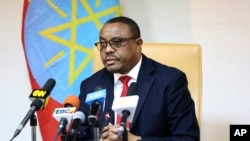Ethiopia’s ruling coalition has elected Abiy Ahmed as its chairman, according to the state-owned Fana Broadcasting Corporation. The move sets the stage for Ahmed to become the country’s third prime minister in 23 years.
The Ethiopian People’s Revolutionary Democratic Front (EPRDF) announced its decision late Tuesday evening, after a series of delays and an election process that was largely hidden from public view.
Ahmed will replace Hailemariam Desalegn, who stepped down last month amid civil and political unrest across the country.
Ahmed, 41, has spent less than a decade in politics. Before joining the House of Representatives in 2010, he became a lieutenant colonel in the Ethiopian National Defense Force.
Founded Internet Security Agency
In 2007, Ahmed founded and later directed the Internet Security Agency, a group tasked with advancing Ethiopia’s technological capabilities, but also responsible, in part, for what human rights groups consider mass government surveillance to stifle dissent.
Ahmed studied in the U.S. and England before returning to Ethiopia to pursue a doctorate at Addis Ababa University’s Institute for Peace and Security Studies. In 2015, he became Ethiopia’s minister for science and technology while a Ph.D. candidate in Peace and Security Studies.
Ahmed had been considered a front-runner since Desalegn’s surprise resignation on February 15. As the leader of the Oromo People’s Democratic Organization, the EPRDF Party that represents the country’s largest ethnic group, Ahmed is considered an insider with a decades-long affiliation with the ruling coalition.
On March 1, former U.S. Ambassador Herman Cohen suggested on Twitter that the decision to elect Ahmed had already been made.
Ahmed speaks Amharic, Afan Oromo and Tigrigna, and he was born to a Christian mother and Muslim father, according to freelance journalist Mohammed Ademo.
Growing rifts
Ahmed’s background as a member of Ethiopia’s Oromo ethnic group, a majority that has long felt marginalized, might help him bridge growing rifts across the country.
Ethiopia is currently under its second state of emergency in two years in the wake of unrelenting protests in the Oromia and Amhara regions. One of the protesters’ primary demands is equal representation in government.
Despite holding the most seats in the federal parliament, the OPDO, which represents the Oromo people, holds less power than the dominant Tigrayan People’s Liberation Front, according to activists and human rights groups.
More recently, however, OPDO has gained its voice and expressed solidarity with the Oromo protesters, according to René Lefort, a journalist who has covered the region since the 1970s.
“The main change is that, first of all, OPDO asserted itself more than ever,” Lefort told VOA by phone in November.
The protests have put pressure on the government, resulting in the EPRDF’s decisions to release prisoners and jockey over reforms. But the coalition has also backtracked on promises to allow space for a plurality of voices in the country.
Just this past Sunday, bloggers, journalists and members of opposition groups were rearrested for gathering at a colleague’s home to celebrate their work.
Human Rights Watch’s senior researcher for the Horn of Africa, Felix Horne, criticized the government’s approach on Twitter.
How Ahmed plans to lead, and what steps the EPRDF will take to address growing turmoil, will now shape the country’s future.




